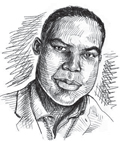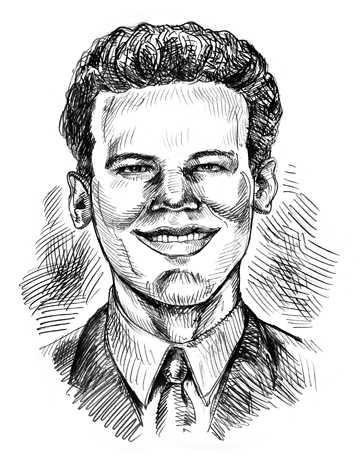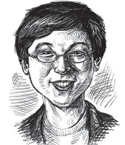The Tech and Learning 100@30

By Matt Bolch, Illustrations By Jay Bevenour
AS PART OF OUR 30TH-ANNIVERSARY CELEBRATION,Tech & Learning has compiled the first two of three lists of the 100 most important people: those leaders from the PAST who have shaped today’s edtech environment, and those leaders from the PRESENT who have been instrumental in the creation and advancement of the use of technology in education. These first 60 honorees appeared earlier this year. We now feature leaders in our last and possibly most challenging list, the FUTURE. These include students doing ground-breaking work in edtech, young entrepreneurs shaping the future of edtech, and those teachers changing classrooms around the nation. Let us know what you think at www.techlearning.com/30thanniversary.
Elsa Eiriksdottir
Elsa Eiriksdottir is a graduate student in engineering psychology at Georgia Tech who works in the Problem Solving and Educational Technology Lab. Her focus is on understanding the capabilities and limitations of human performance from the perspective of perception, cognition, and movement control and applying this knowledge to the design of systems and environments that accommodate those capabilities and limitations. The goal of her dissertation is to uncover how the learning situation and instructional materials can be constructed to create conditions that enhance learning and transfer.
Ntiedo “Nt” Etuk

Ntiedo “Nt” Etuk co-founded and serves as CEO at Tabula Digita Inc., creator of the award-winning DimensionM educational video game series for math. The company focuses on creating technology-based tools for the K-12 market. The company recently unveiled the DimensionU Learning System, educational video games centered on core K-12 subjects such as math, literacy, science, and history. Etuk is a 2010 Henry Crown Fellow at the Aspen Institute and a member of the Aspen Institute’s Nigeria Leadership Initiative program.
Allen V. Robnett
Tools and ideas to transform education. Sign up below.
Allen V. Robnett’s students at Gallatin High, just outside Nashville, Tennessee, believe he is out of this world. For his innovative courses, which build science, math, and technology skills through hands-on learning, Robnett has been named the 2010 recipient of the Alan Shepard Technology in Education Award. His Astronomy and Space Exploration class features an in-school planetarium and a rooftop observatory, while the Aviation Theory and Practice class combines actual textbook and simulator pilot training. Robnett developed both courses from scratch and procured grants and in-kind donations to obtain flight simulators, a planetarium, and an observatory. Read more
Matthew Peterson
Matthew Peterson co-founded the nonprofit MIND Research Institute, which develops math instructional software and systems as well as conducting basic neuroscientific, mathematics, and education research. Peterson created the institute’s ST Math computer software, which teaches teaches math to students using MIND’s unique non-language-based approach. Peterson, who has a doctorate in neuroscience from UC Berkeley, is the author of Interactive QuickTime: Authoring Wired Media.
Keith R Bujak

Keith R Bujak has researched how mobile phones and text messaging can support learning in areas where Internet connections are limited. Results of a pilot study conducted at Georgia Tech’s Problem Solving and Educational Technology Lab showed that complex interactions are possible. Participants found the system easy to understand and a useful learning tool. Bujak is an engineering psychology doctoral candidate at the university and his current interests include active, constructive, and interactive learning, mobile learning, and cognitive science-based physics education.
Andy Crozier
Andy Crozier proves that innovation takes place every day in classrooms across the world. Crozier, coordinator of Digital Learning Technology at the Grant Wood Area Education Agency in Cedar Rapids, Iowa, was named an ISTE Emerging Leader for 2010. Grant Wood AEA offers webinars supporting assistive technology and instructional, and online resources for the classroom. Crozier is a Google Certified Teacher and an Apple Distinguished Educator. Read more
Stephen Shapiro

Stephen Shapiro is the president of SchoolFusion, which provides Web site and communications solutions for K-12 education, serving more than 5,000 schools and 1 million users in 44 states. Shapiro provides overall direction of SchoolFusion solutions, features, and technology developments. He discovered his interest in education technology while examining the impact of the Internet on rural eastern Africa while in a master’s program at the University of Colorado. Starting from the perspective of a student, Stephen and his team built, “What we wish we had as a student.” Including a next generation calendar solution which then evolved into a Learning Management Solution and finally, SchoolFusion, a Website solution that includes all the above.
Dan Meyer

Although Dan Meyer is taking a break from teaching high school math to study for a doctorate in education at Stanford University, his passion for teaching shines bright. Meyer’s proposal for a new way to teach math, presented as part of TEDxNYED, has had nearly 100,000 views on YouTube and has been reposted on many education sites. TEDxNYED brought together educators, innovators, and idealists earlier this year to share their vision of education. His specific interests include building ideal learning experiences for students through curriculum design and answering questions about teacher education, such as how they learn and how to best teach them to teach. Read more
Mathew A. Powers
Mathew A. Powers brings a wide variety of gaming and eLearning strategies to his lecturer role in the School in Infomatics at the Indiana University- Purdue University Indianapolis (UIPUI). His teachings focus on 2D and 3D animation, virtual reality environment construction, and Web design, specializing in character, environment, narrative, and game creation. Powers also works as a Flash media developer at Option Six, which develops eLearning solutions. At Option Six, he has designed and created e-Learning applications and animations for clients such as Microsoft, Lilly, and Toyota.
Julie LaChance

Julie LaChance, technology facilitator at Northwest Cabarrus (NC) High School, was named ISTE’s Outstanding Young Educator for 2010. In 2009, she was named North Carolina Instructional Technology Educator of the Year. LaChance has worked closely with school improvement teams and others to create a modern computer lab with SMART boards, animation stations, podcasting centers, iPod cart and full working lab. She founded NC Second Life Educators, an educational group in Second Life dedicated to helping teachers use the virtual world in the classroom and to sharing general educational ideas, and EDTECH Retreat, which assists with educational endeavors in Second Life. Read more
Richard Byrne
High school social studies teacher Richard Byrne founded the Free Technology for Teachers Web site (www. freetech4teachers.com), which provides educators with ideas and instruction for using free, Web-based resources to improve student engagement and learning. The blog and learning resources site, founded in 2007, has grown to more than 50,000 unique visitors a month. Byrne, who teaches in a rural Maine district, believes that technology integration in the classroom is key to students learning and creating collaboratively with their immediate peers and their peers around the world, according to an interview with the SimpleTechIntegration Web site. Byrne also is a lecturer on technology topics.
Eric Sheninger
Eric Sheninger, principal at New Milford High in New Jersey, is not afraid to to show America his strengths and weaknesses. When he was a first-year principal at just 33, he was featured on TruTV’s The Principal’s Office, a reality show about the trials and tribulations of leading a school. His appearance on that and CW Network’s OfficeMax Schooled brought more than $70,000 to the school to purchase technology items and other needed school supplies. The Google Certified Teacher also has tapped into the community through “The Principal’s Report,” a monthly Web report on student honors, facility improvements, professional development, and classroom innovations.
Mary Beth Hertz

Mary Beth Hertz served as co-founder and co-organizer at Edcamp Philly (www.edcampphilly.org), described as an “unconference,” a free, informal gathering of teachers and administrators focused on K-12 education. A computer teacher and technology teacher leader at Guion S. Bluford Elementary School in Philadelphia, Hertz was named a 2010 Emerging Leader by ISTE. Her ideal school would encourage open dialogue, student-centered learning, and high levels of staff collaboration with each other and the community at large using social media tools. Students would express themselves through blogs and collaborate using wikis. Hertz also blogs at Philly Teacher (http://philly-teacher.blogspot.com/).
Buffy Hamilton
Buffy Hamilton is a media specialist at Creekview High School in Canton, Georgia, and the founding librarian at The Unquiet Library (http://theunquietlibrary.wordpress.com/), a blog that chronicles her experience at what she calls a “Library 2.0.” She is the author of the Media 21 Capstone Project, which helped students learn about social media and cloud computing tools for learning and as a way to build personal learning networks, and which is used in the Cherokee County School District. Hamilton also serves as a keynote speaker, workshop consultant, and adjunct trainer.
Philip Tan Boon Yew

Philip Tan Boon Yew is the executive director for the U.S. operations of the Singapore-MIT GAMBIT Game Lab, a game research initiative hosted at the Massachusetts Institute of Technology. He is concurrently a project manager for the Media Development Authority of Singapore. He has served as a member of the steering committee of the Singapore chapter of the International Game Developers Association. He has produced and designed PC online games at The Education Arcade, a research group at the Massachusetts Institute of Technology that studied and created educational games. His specialties include digital, live-action, and tabletop game design, production, and management.
Marleigh Norton
Marleigh Norton is lead interaction designer for the Singapore-MIT GAMBIT Game Lab, a collaboration between the Massachusetts Institute of Technology and the government of Singapore to explore new directions for the development of games as a medium. GAMBIT emphasizes the creation of video game prototypes to demonstrate the group’s research as a complement to traditional academic publishing. She designed educational-augmented reality games at the MIT Scheller Teacher Education Program and worked as an interaction designer for the Waterford Research Institute. Norton’s specialties include human-computer interaction, user interface design, educational games, games for children, location-based gaming, augmented reality, and experimental input devices.
Thuan Nguyen
Thuan Nguyen has built his career at the Kent (WA) School District the way the district developed its technology infrastructure—one piece at a time from a firm foundation. He recently was named chief information and operations officer, and played a key role in not only beefing up district technology initiatives, but completing those projects with an eye toward reining in costs. Major projects include an HR and payroll conversion, two secondary technology academies and a large laptop initiative. Another facet to his leadership is promoting technology upgrades to the staff and community. In 2008, he was named a Computerworld Honors Program laureate. Read more
Steven Mudrick
Steven Mudrick is a middle school teacher and technology specialist at the Theater Arts Production Company School (TAPCo) in the Bronx, NY. For the fourth consecutive year students under his direction have received the J.P. Morgan Chase “Multimedia in the Classroom” Award, given to schools that demonstrate creative use of classroom technology. At this year’s New York Institute of Technology commencement, Mudrick received the John J. Theobald Graduate Achievement Award in Instructional Technology. He models the integration of technology in his classroom and uses multimedia as a tool to engage and excite his students about learning.
Evan Allred
Dysart Unified School District (AZ) continues to make strides incorporating technology into classrooms under the guidance of Evan Allred, director of information technology. Allred, named Technology Director of the Year by the Arizona Technology in Education Association in 2004, recently led the completion of the district’s three-year education technology plan. Student technology literacy is assessed twice a year on a small sampling of students. Employees have VPN access through home computers, accessing district resources through a link on the district Web site. More than 250 teachers have completed the Intel Essentials Course and the Intel Teach Thinking Course, and the district is developing online course capacity through Moodle. Read more
Jennifer Corriero and Michael Furdyk


Jennifer Corriero and Michael Furdyk are co-founders of TakingITGlobal (TIG), a Canadian nonprofit that aims to inspire, inform, and involve youth interested in global issues and creating positive change. TIG’s mission is to create a collaborative learning community that provides young people global opportunities, cross-cultural connections, and meaningful participation in decision-making by leveraging technology, creating a cohesive youth movement, and championing the role of youth as key stakeholders. Corriero, who serves as executive director, leverages her experience developing programs for youth that leverage technology, collaboration, and entrepreneurship. Furdyk, director of technology, works with the TIG ed education program and has made presentations to more than 50,000 educators about the importance of engaging students and integrating technology and global perspectives into the classroom. Read more
Troy Hicks
Troy Hicks, assistant professor at Central Michigan University, is the author of The Digital Writing Workshop published in 2009. The English professor is involved in Project WRITE (Writing, Reading, Inquiry and Technology Education). In 2007, 40 teachers formed a learning community to examine student work with the intent of identifying pedagogies and materials that improve adolescent literacy and thoughtful integration of technology. Hicks also is director of the Chippewa River Writing Project, a site of the National Writing Project that supports a summer institute for K-16 teachers of writing. Here he delves into ways that teachers can positively implement technology (i.e., podcasting, wikis, etc.) into their classrooms.
Erin E. Reilly
Erin E. Reilly is co-founder at and served on the board of directors at Platform Shoes Forum, a nonprofit that helps young women pursue careers in science, technology, engineering and math (STEM). She is co-creator of PSF’s model program Zoey’s Room, a national online community for 10-14-year-old girls, encouraging their creativity in STEM subjects which won her a Leaders in Learning Award from Cable in the Classroom. Currently, Reilly is the research director for Project New Media Literacies of MIT’s Comparative Media Studies Department, an initiative that supports research and innovative teaching methods to engage today’s digital kids. Read more
Jay Bachhuber
Jay Bachhuber is a researcher at the Center for Children and Technology, part of the Education Development Center. With support from the Bill and Linda Gates Foundation, Bachhuber and CCT are developing handheld games and research that target struggling middle-grade readers, whose limited comprehension skills often hold them back from full exploration of difficult content. Before joining CCT, he worked as a freelance game designer, curriculum designer and writer on a number of domestic and international educational gaming projects. He’s also managed an after-school program in New York City where students studied game design and partnered with a game studio to create an award-winning video game about Hurricane Katrina. Read more
Ryan Imbriale
As assistant principal at Perry Hall High School in Baltimore County (MD) Public Schools, Ryan Imbriale works to integrate technology into the classroom for both students and teachers. A key success was the formation of an action team to bring technology into instruction, data management, and classroom management, including video streaming, a ConnectEd system for parents, and a swipe system for attendance information. Imbriale teaches graduate education classes for The John Hopkins University and is a consultant for The Opportunity Group, which assists school personnel bring 21st century tools into the classroom. He is a member of ISTE’s Board of Directors.
Tony Mangiacapre
Tony Mangiacapre, high school physics teacher at St. Mary’s High School in Manhasset, NY, has combined his degree in instructional technology with modern communications to enhance his own classroom instruction and incorporate new methods of learning and sharing instructional strategies with teachers worldwide. He has taken the entire New York State physics curriculum and put it on a Web site that contains his daily lesson plans with graphics, Flash animation, simulations, interactive games and exams, and YouTube videos. These lesson plans are shared with teachers throughout the United States, England, Scotland, Australia, New Zealand and other countries. Read more.
Eric Langhorst

Eric Langhorst brings technology to the students he teaches at South Valley (MO) Junior High School. That technology includes “studycasts,” audio Podcasting technology to help students prepare for tests, as well as blogging as both an education and communications tool. He also presents workshops for teachers in the district on Podcasting, blogging, online assessment, e-mail and other classroom applications. Langhorst is on the adjunct faculty at Park University, where he teaches a graduate course on”Technology for the Classroom.” He recently was named by Kansas City business magazine Ingram’s as member of its 2010 class of “40 Under Forty,” a list of rising young business and civic leaders.
Lenny Schad
Katy (TX) Independent School District uses the latest technology to instruct students, thanks to Lenny Schad, chief information officer. The district has a 3:1 student to computer ratio and recently piloted mobile learning devices among fifth-graders who used the devices both at school and at home for such subjects as math, science and language arts. Technology is used to boost student achievement, requiring a mindset change among many teachers. In order to keep pace with technology-native students, the technology department is reaching out to parents through open houses centered on technology students use in their classes.
Brian Nichols

For transforming Hidenwood Elementary School in Newport News, VA, from one facing sanctions into one that exceeded AYP benchmarks for two consecutive years, ASCD named Principal Brian Nichols its 2010 Outstanding Young Educator. Nichols has a reputation for turning around troubled schools through the effective use of technology and innovating teaching practices. Hidenwood had no classroom technology, and now 100 percent of classrooms have such tools as interactive whiteboards, projectors and document cameras. He also created a virtual data wall for each student to track progress that’s been emulated in the district, allowing individualized instruction for students who aren’t meeting benchmarks.
Lisa Johnson
Lisa Johnson, technology resource teacher in the Jefferson County (KY) Public School District, created The 180 Degree Classroom, in which teacher and students switch roles. High school students create “teaching modules” for content traditionally taught by the teacher. While students prepare and learn from the teaching modules, the teacher focuses on providing classroom experiences that incorporate the lessons learned through the modules.
Jill Hobson
As director of education technology for Forsyth County (GA) Schools, Jill Hobson oversees the district’s online learning management system and Web content management system. She works closely with the Academics and Accountability division to promote instructional technology that accelerates student learning. Under Hobson, the district created a blended approach to online learning that reduces (and in some cases eliminates) the need for textbooks. Hobson serves as the president and founding member of the Georgia Society for Instructional Technology (G-STE) and is an active member of the Consortium for School Networking and the Georgia K12 CTO Council.
Matt Federoff
Matt Federoff surfs on the leading edge of technology in the Vail (AZ) School District. Federoff, director of technology, led one of the nation’s early efforts to connect schools using wireless technology, later providing wireless access at each school site. In 2005, he led the opening of Empire High School, called the first textbook-free school in the United States. Students are issued laptops, and technology helps form the core of the learning experience, much of which is self-directed. He was named the 2005 Arizona Technology Director of the Year and currently is involved in the Beyond Textbooks Initiative, extending the Empire methodology across all grade levels.
Karl Fisch
Karl Fisch, director of technology at Arapahoe High School in Centennial, CO, is glad to be back in the classroom this fall, albeit teaching just one section of Algebra. He’s been at the school since the early ‘90s, transitioning into the full-time technology position at the school 12 years ago before returning to the classroom because of budget cutbacks. Through grants Fisch has received, Arapahoe High is a 1:1 laptop school, creating blogs, Podcasts and writing Web-based “textbooks” for their science courses. Fisch believes in staff development, introducing new instructional and technology tools. He writes a blog, The Fischbowl, at http://thefischbowl.blogspot.com/.
